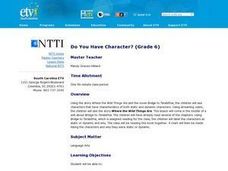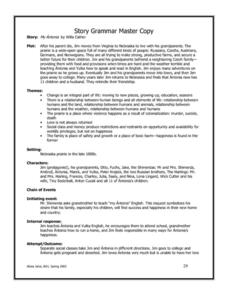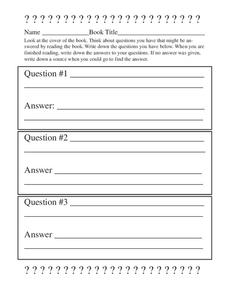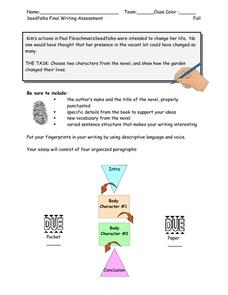Curated OER
What a Character!
Middle schoolers read a novel and discuss character personality. First, they analyze a character in a novel and keep a chart or web of the character's identity, which includes specific examples from the book. They then write a script...
Curated OER
Introduction to Main Events
Identify main events in a text. Readers will read The Kissing Hand and discuss the main events of the story. They will use sentences strips to write down events and place them in order. Alternative books are suggested.
Curated OER
Responding to Literature
Your class will create a four section flip book and write titles for characters, setting, problem, and solution. They will also draw a picture to show what they wrote about.
Curated OER
Character Development Project
Read Dangerous Minds with your language learning disabled pupils to identify characteristics and connect to literature. This is a specific activity intended for use with the suggested book. The class uses a character map as a way to...
Curated OER
Five Minute Quickies
Challenge your class to take just five minutes to complete the tasks in each slide. The end result will be a short story. Each text includes writing a certain element of a story: opener, ending, characters, and more. After completing...
Curated OER
Do You Have Character?
Sixth graders read Katherine Paterson's novel, Bridge to Terabithia, and watch a video of Maurice Sendak's book, Where the Wild Things Are. They examine the characters in both stories that share similar characteristics. Students use the...
Curated OER
Springfield Wiki Lesson - Literature Circles
Using a variety of novels about survival, such as Julie of the Wolves by Jean Craighead George, pupils create author's studies using wikis. First, learners are placed in groups to study a particular novel. Then, they create a page...
Curated OER
Special Traits: Alabama quarter reverse
Who knew a state quarter could say so much? Alabama's quarter is embossed with an image of Helen Keller, pupils will use this image to think about what the phrase "Spirit of courage" means. They will use a graphic organizer to...
Curated OER
Dramatic Structure
As part of an lesson involving literature or writing, have your learners watch and discuss this presentation on plot development. In a series of slides, viewers engage in an activity to explore dramatic structure, including plot...
Curated OER
Stop, Think, Go!
Show this presentation to your students at the beginning of the school year and they'll know just what to do when they are having a hard time making good decisions. This resource asks students to remember to use their own personal...
Do2Learn
Story Organizer
Kids can get all their plot points in line by filling out this graphic organizer with information from a story they have read. Pupils note down the title and author, the characters, the setting, and four events from the story.
Do2Learn
Reading Response Form
What makes a character believable? Have learners write a response to this question by explaining why they found the characters in a given story or novel to be believable or not believeable.
Do2Learn
Sequencing Chart
Take note of events in a story with this organizer. Learners write down the who, what, where, and when, writing down four events in the order that they occur.
Curated OER
My Antonia: Story Grammar
Pupils can write down all of the major plot elements of My Antonia by Willa Cather on this straightforward worksheet. Learners note down themes, characters, the chain of events, and more.
Curriculum Corner
Fiction Organizer
Teach your youngsters about the elements of plot with this handy graphic organizer. Pupils note down the main character, the setting, the problem, and the solution of any fictional story they read.
Mariely Sanchez
Story Map
What just happened in that story? Kids can track the plot of any story using this worksheet. They fill in the title, author, and illustrator as well as the setting, characters, major plot points, and their own conclusion about the story.
Ideas From Suzi
Responding to Literature
Guide your class through a text with resources for before and after reading. Learners ask questions, discuss characters and plot points, point out elements of the reading that stood out, and compose brief summaries.
Maine Content Literacy Project
Process of Reading
Assist your pupils with literary analysis by discussing and exploring theme. This plan, the twelfth in a series of fourteen, builds in some time to explore theme as a class. Learners also blog about the main event in their stories and...
Curated OER
Seedfolks Final Writing Assessment
Wrap up a study of Seedfolks with a final essay. Writers can draft their essays by following the steps and filling in the organizer provided here. The packet begins with a prompt, includes a few basic requirements, and provides an...
Curated OER
Seedfolks Character Chart
There are quite a few characters in Paul Fleischman's Seedfolks, so why not help your class keep track of them? Learners can mark up this chart to show the traits that apply to each character. Along the left, each character is listed,...
Curated OER
The Outsiders Essay Question Options
Extend your study of The Outsiders by S.E. Hinton with an essay. Pupils can choose one of the three prompts provided on this page and write about either characterization, conflict, or theme. Each prompt includes a brief definition of the...
Polk Bros Foundation
I Can Identify and Infer Character Traits
Use the guiding questions on this page to fill out the two graphic organizers included in the materials tab. All of the materials focus on character or personality traits and ask pupils to find textual evidence of the traits they...
Polk Bros Foundation
I Can Infer Motives
Why did they do it? Get to the bottom of complex characters and people by analyzing their motivation. Learners select an action and take a close look at that action in order to infer motive. They then explain why they determined that...
Polk Bros Foundation
I Can Identify/Infer Motive
Why do people and characters act as they do? Require your class figure out the motivation of two people or characters they read about in a given text. In the short charts, pupils note down who, what they do, and why they do it. After...

























